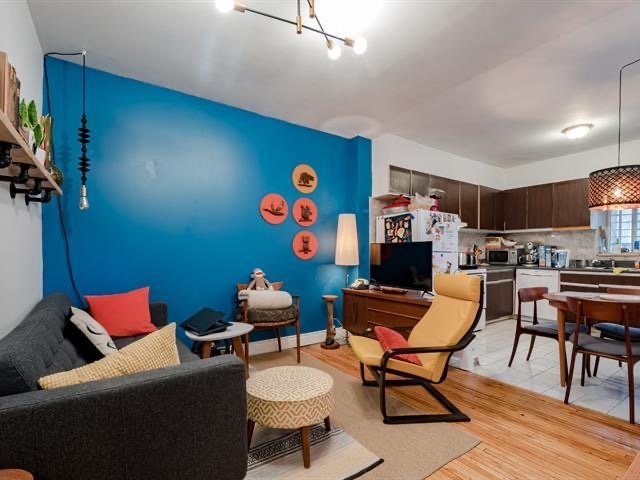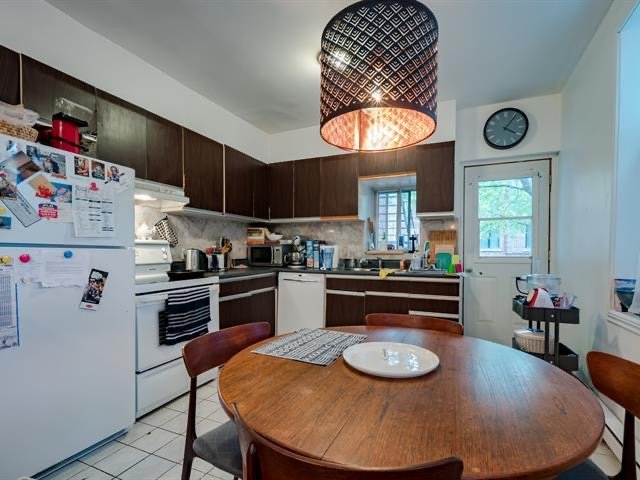
By
Kalina Laframboise
Global News
Published August 29, 2023
7 min read

This is the sixth instalment of New Roots, a series from Global News that looks at how evolving migration patterns and affordability challenges have changed life in communities across Canada since the COVID-19 pandemic.
“Apartment swap only,” begins the advertisement for renter Adam Reider’s three-bedroom, ground-floor apartment in Montreal’s sought-after Notre-Dame-de-Grâce neighbourhood.
The spacious home, which also has access to a private yard, parking and an unfinished basement, is listed at $960 per month on Facebook marketplace. It’s right by the Metro system and provides easy access to downtown. The rent is enviable compared to the national average for three-bedroom apartments — which hit $2,413 in July.
And that is why Reider is open only to an apartment swap, which is a mutually agreed-upon transfer of two separate leases, with another tenant who has the exact apartment his family of four needs.
His self-managed listing has been up for months and Reider says he receives up to 30 messages per day from hopeful renters in a city with little supply and high demand.
“You MUST have an apartment to exchange leases,” the advertisement reads. “Tell me what you have to offer in return, or you will not get a reply. We are NOT interested in giving up this amazing apartment unless you have an apartment to offer in return.”
Reider is patient, describing the process as a “marathon, not a sprint.” He is prioritizing his family’s needs, which include a bigger space and rent within a $2,000 budget. The family cannot compromise on location since the two children need to be able to get to school by public transit.
But Reider, who has lived in the same place for 13 years, has also received offers of financial compensation in the thousands to take over his lease from desperate Montrealers who don’t have an apartment to swap.
“It’s sort of like the market is pressuring people to spend that kind of money to buy somebody else’s lease,” he says. “It’s crazy.”

Apartment swapping has been gaining steam over the last few years in Montreal, which was once considered a renter’s paradise compared to other major Canadian cities, as rents rise.
Rentals.ca found the average asking rent in Montreal hit $1,987 in July — 15.3 per cent annual increase — putting the city among the top spots for fastest rent growth among the country’s largest markets.
In 2022, the Canada Housing and Mortgage Corporation (CHMC) recorded the Montreal area’s biggest annual increase in average two-bedroom rent in two decades: 5.4 per cent.
“Housing crisis is the term,” says Jayne Malenfant, an assistant professor in the department of integrated studies and education at McGill University, in an interview with Global News.
“And we can see during COVID that this has gotten worse. Prices have gone up.”
Apartment swapping happens through mutual lease transfers, which allow both parties to find exactly what they are looking for and to switch homes. Lease transfers are legal in Quebec.
Malenfant says a lease transfer is “one of the few tools” that renters in Montreal have to access affordable housing in a quickly changing market. A lease transfer is a formal process, but it also acts as an informal means of rent control in the province.
In Quebec, landlords can ask tenants for a rent increase that they deem “just and reasonable” ahead of the lease renewal, according to the province’s housing tribunal. However, a tenant can negotiate or refuse the increase. The two parties can also take the case to the province’s rental board, which can ultimately set a fixed price.
Swaps are a strategy that builds on the tool of lease transfers, Malenfant explains. It gives renters the ability not only to exercise choice in apartment hunting — but allows them to work together to keep leases as they were agreed upon with their landlords.
“Lease transfers are a way where you might be able to swap with someone in your community and you can meet each other’s needs in ways that the market isn’t meeting them,” Malenfant says.
Recent CHMC data also highlights the woeful proportion of vacant apartments in the city as renters grapple with price increases.
Vacancy rates ballooned from 1.5 per cent in 2019 to a pandemic-fuelled three per cent in 2021. They then fell back down to two per cent in 2022. In Canada, the average apartment vacancy rate was 3.2 per cent between 1990 and 2021.
In Montreal, the crisis has hit such staggering heights that a study earlier this year by Centraide Montreal found one in five households can’t afford both rent and basic needs. The organization warned the housing crunch has a terrible spillover effect on child development, mental health, food security and homelessness.
Meanwhile, students are also feeling the squeeze in a city that is home to four universities — with some going so far as to cram three people into a single-bedroom apartment. Earlier this month, a study by l’Unité de Travail pour l’Implantation de Logement Étudiant, an organization that builds student housing, found rent for students jumped 20 per cent over the last two years for two-bedroom apartments.
“The choice is much smaller than I think a lot of people realize,” says Malenfant of the current housing situation in Montreal.
“You’re having to compromise in ways where also, you know, you might end up living in places that are unsafe or there are health issues. There are things that are wrong that are impacting your daily life, and you just have to put up with it because you literally can’t afford anywhere else.”

With fewer choices and rising costs that far exceed modest salary increases, renters like Gaby are turning to apartment swapping to find homes in Montreal that suit their financial and other basic needs.
Gaby, who spoke on the condition of anonymity to prevent reprisal from potential landlords, is on the hunt for an ideal exchange. As a full-time worker, she is hoping to find an apartment at a lower price than her current rent and where she can live alone.
“It was clear that if I were to find affordable housing and live alone, a swap would be kind of the only option,” Gaby says.
But apartment swapping and lease transfers could be in jeopardy with proposed legislative changes in Quebec.
Both the renters that Global News spoke to are worried about legislation known as Bill 31 proposed by Quebec Premier François Legault’s government.
If adopted, landlords will have the right to refuse and terminate lease transfers — which would also effectively crack down on apartment swaps. The current law requires that landlords must have a “serious reason” for nixing a transfer.
Bill 31, which was tabled in June, has led to protests in both Montreal and Quebec City in recent months, with some housing advocates going so far as calling for a rent strike.
“It’s causing anxiety,” says Gaby, adding she has only ever lived in places passed on through lease transfers.
“And for them to clamp down on lease transfers is just going to clamp down on affordability and that’s going to really squeeze out so much of the community that makes Montreal, Montreal.”
Reider, who hopes to make an apartment swap in the next year, says that new legislation is “highly problematic.” As an artist and musician, he says Montreal is such a great hub for the arts because “it was an affordable city and that’s changing.”
“And it’s one of the last ways for people to have any control over rising rents costs, especially in the wake of AirBnb and other things like that, is to have lease transfers.”
While Reider says he and his wife aren’t earning high salaries, they are doing OK — but he warns Bill 31 could leave more vulnerable tenants like artists and low-income Montrealers in a tough situation.
“I worry that this legislation is going to make it much worse,” he says of the housing crunch.
In late August, Quebec’s minister responsible for housing said in a scrum she was open to changing parts of Bill 31 regarding lease transfers. France-Élaine Duranceau said the purpose of tabling the bill in the early summer was “so that everyone could put forward their ideas.”
“We’re listening. We are going to do this more formally in the parliamentary committee. If there is a need to improve, modify, we will see,” she said. “I’m not excluding anything. I want a balance in all of this.”
— with files from Global News’ Amanda Jelowicki, Alessia Simona Maratta and The Canadian Press


Comments